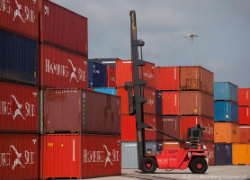As we wrap up week one of the federal government shutdown, impacts on international exports are being felt in a major way. Visit the Department of Commerce’s Bureau of Industry and Security (BIS) website and you find the following disclaimer:
The Federal Government is currently shut down due to a funding lapse. As a result, the Department of Commerce’s Bureau of Industry and Security (BIS) is no longer accepting export license applications, classification requests (CCATS), encryption reviews, encryption registrations, or advisory opinion requests. Similarly, BIS will not be issuing any final determinations. The SNAP-R application on BIS’s Website is not available and will not reopen until the Federal Government shutdown ends. All pending export license applications, commodity classification requests, encryption reviews, encryption registrations, and advisory opinion requests will be held without action by BIS until the shutdown ends.
A similar notice appears on the State Department’s Directorate of Defense Trade Control (DDTC) website.

Photo: Bloomberg
The two agencies process various types of export licenses for military and dual-use goods (goods with both a military and commercial use). These goods include everything from military vehicles and ammunition to composite structures and computer processing chips. Given the large military/dual-use industry in Colorado, Ball Aerospace, Lockheed Martin, Jeppesen, etc., it seems appropriate to look at the potential impact the shutdown will have on international trade and local Colorado companies.
The grant of export licenses is nearly at a standstill with the exception of those “emergency licenses” needed to support ongoing combat and contingency missions.
In 2012, BIS processed 23,229 export licenses requests and the DDTC processed 89,650 between September 2012-September 2013; equating to 112,879 licenses total. Based on these numbers, the two departments process approximately 2,170 licenses a week. On average, it takes both the agencies 12-15 business days to process and respond (grant, return without action, or deny) the requests. Each day that the government remains shutdown, the number of license requests sitting in the backlog grows. In turn, companies are unable to ship goods until a budget is passed, funds are appropriated, and the backlog is depleted.
International customers are becoming frustrated because U.S. companies cannot provide accurate lead times for the shipment of goods. These customers, who are arguably already frustrated by the high level of regulation of military and dual-use items, will start looking outside of the U.S. for companies who can ship a competing product in a timely fashion. Further, this standstill has created a significant slow down in sales of military/dual-use products. U.S. companies struggling to obtain export licenses during the shutdown have expressed concern for profitability and stock prices, especially as many companies are wrapping up their final fiscal quarter.
Exports make up $2.196 trillion of the $15 trillion U.S. economy. If the government remains shutdown for much longer, it will have a significant impact on companies’ bottom line, the U.S. economy, and international market relations. In the short term, companies’ final quarter will experience a decline in their international exports, which will ultimately affect a large portion of the U.S. economy. In the long term, companies risk losing international customers who have found competitors outside of the U.S. and the international opinion of the U.S. military/dual-use market will be further compromised.
Alicia Guber is a 2L and the Alumni Editor on the Denver Journal of International Law and Policy.

